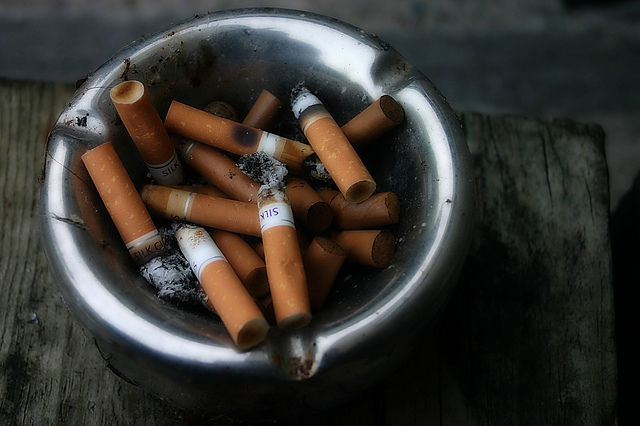
Scientific Method / Science & Exploration
As FDA preps e-cigs rules, scientists and Congress rally to support vaping
Fierce debate erupts as sides fight to protect children and smokers from tobacco.
by Beth Mole - Apr 26, 2016 10:20pm SAST

Kieran McCarthy
The 2017 Agriculture Appropriations Bill may not seem like a stirring piece of legislation to most, but it raised quite a few eyebrows last week as it passed through a House subcommittee with a key amendment—one that aims to spare the vast majority of electronic cigarettes from impending federal regulations.
The bipartisan effort to protect the burgeoning e-cig market is just the latest in a long-smoldering debate reignited by the Food and Drug Administration’s plans this year to begin regulating the new devices as it does traditional tobacco products. The crux of the controversy is about whether e-cigarettes act more as a gateway into or a ticket out of dangerous tobacco use, the single largest cause of preventable deaths in the US.

Enlarge / E-cig flavors.
Wikimedia
Proponents argue that the new FDA regulations will protect children from bad habits. For instance, one of the proposed rules will prevent e-cig makers from using youth-based marketing—like edgy, rebellious ads and candy-flavored e-cigs—that can hook kids into lifelong nicotine addictions and deadly tobacco habits. Such marketing strategies were first used by tobacco companies decades ago and were highly successful until the FDA banned the practice. With e-cig companies already copying the tactics, many politicians and public health experts have chided the FDA for not rolling out regulations faster. The agency first proposed rules back in 2014.
However, other experts called for the agency to go soft on the electronic devices. In a report published Monday in the journal Addiction, a group of international medical researchers argued that overly strict regulations could keep the electronic devices out of the hands of smokers who are trying to quit or at least cut back. Additional taxes, purchasing restrictions, and rules will only create barriers for low-income smokers who might otherwise replace some or all of their cigarettes with e-cigs, the authors argued. And barriers to e-cigs could equate to barriers to improving health since the new devices are estimated to pose just five percent of the mortality risks of smoking regular cigarettes.
"We're concerned the FDA, which has asserted its right to regulate e-cigarettes, will focus solely on the possibility that e-cigarettes and other vapor nicotine products might act as a gateway to cigarette use," said David Levy, an oncologist at Georgetown University and coauthor of Monday’s report. "We believe that the discussion to date has been slanted against e-cigarettes, which is unfortunate, because the big picture tells us that these products appear to be used mostly by people who already are or who are likely to become cigarette smokers.”
Foggy Fight
Several studies found that smokers were at least 15 times more likely to use e-cigarettes than people who don’t already smoke. And this is one of the reasons vaping advocates and politicians pushed for the agriculture bill amendment protecting e-cigarette devices last week. If enacted, the amendment would effectively abolish a “predicate” date written into the FDA’s proposed rules. The regulations are written such that any electronic cigarettes, vaporizers, or other smokeless tobacco products introduced after the predicate date of February 15, 2007 would get pulled from the market to go through an FDA pre-market approval process. Since the vast majority of such devices were introduced after 2007, the rule could decimate access to e-cigarettes and kill off many small vaping companies, critics argued. In turn, the regulation would give an upper hand to big tobacco companies, which currently have only a small share of the e-cig market but could easily weather such regulatory storms, critics add.
The bipartisan amendment, introduced by Rep. Tom Cole (R-Okla.) and Rep. Sanford Bishop (D-Ga.), passed in a 31 to 19 vote last Tuesday.

Enlarge
Ecig Click
“This is fantastic news for public health and small businesses,” said Gregory Conley, the president of the American Vaping Association. “The vapor industry and its consumers do not oppose sensible regulation, but the FDA’s proposal is anything but sensible.”
But many health organizations condemned the move. In a letter to politicians, 31 groups, including the American Academy of Pediatrics, the American Heart Association, and the Campaign for Tobacco-Free Kids, came out against the amendment, arguing that it would make the FDA’s job of addressing the public health threat of tobacco products more difficult.
In a separate statement, Matthew Myers, president of the Campaign for Tobacco-Free Kids, said of the amendment: “Make no mistake: These provisions benefit the tobacco industry at the expense of our nation’s children.”
The Centers for Disease Control and Prevention notes that the number of kids using e-cigs has risen significantly in the past few years. Currently, the agency estimates that 2.4 million US high school and middle school kids used e-cigarettes within the 30 days prior to surveying. In a study published Monday, CDC researchers found that exposure to e-cig advertisements increased the likelihood that an adolescent would try vaping.
“Kids should not use any type of tobacco product, including e-cigarettes,” Tom Frieden, CDC director, said in a statement. “Exposure to e-cigarette advertising is associated with youth e-cigarette use - and that is concerning to me as CDC Director, as a doctor, and as a parent.”
While experts are most concerned with the health effects of tobacco-based nicotine in e-cigarettes, there have also been worrying reports about the unregulated flavorings and additives in the vaporized liquids used with the devices. Still, whether this will drive a resurgence of cigarette use in adolescents is unclear. Currently, cigarette smoking among high school and middle school kids is the lowest it has been in decades—with continuous year-to-year drops since 1997.
"Until clearer data are available," Levy and his coauthors conclude, "our ability to understand the impact of [vaporized nicotine product] use will need to be based on careful and prudent extrapolations of their probable benefits and harms from shorter-term evidence."
Addiction, 2016. DOI: 10.1111/add.13394 (About DOIs).
source: https://www.consumeraffairs.com/new...-cigs-may-not-be-so-bad-after-all-042516.html




